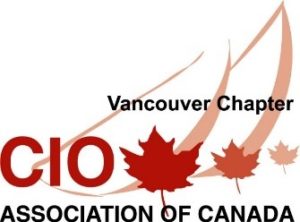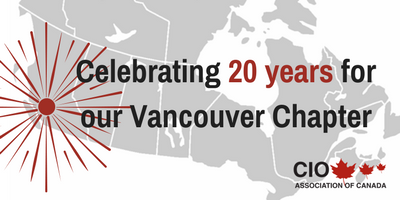by Catherine Boivie
Founder and Honorary Life Member,
CIO Association of Canada
In 1996 Catherine Boivie moved from Toronto to Vancouver to take up the position of Director of IT at BCAA. In her first few weeks there, she found herself calling CIOs she knew in Toronto to exchange information and network. She soon realized that there was a need for an organization that could provide opportunities for CIOs to meet with colleagues, without any marketing, to exchange information and build their professional networks. At that time, there were no organizations that provided these features.
 Catherine, Jim Williams, CIO of A&W, and Blaize Reich, professor at SFU Beedie School of Business shared a bus trip to Microsoft in Redmond. Their conversation confirmed the conclusion that there was a need for such an organization. Their response to the need was to become founding board members. Administrator Judy Waller was hired, and a few other volunteers were recruited, and in May 1997, the CIO Association of BC was established: CIOABC. Events geared toward CIOs were organized, promoting the idea that the most trusted sounding board is the CIO sitting next to you. The initial goals were to facilitate networking and knowledge sharing among CIOs, to focus on the management of technology rather than technology itself, to be vendor neutral, to support the development of future CIOs, and to be the voice of technology in BC. This mandate continues to provide the principles of the CIO Association.
Catherine, Jim Williams, CIO of A&W, and Blaize Reich, professor at SFU Beedie School of Business shared a bus trip to Microsoft in Redmond. Their conversation confirmed the conclusion that there was a need for such an organization. Their response to the need was to become founding board members. Administrator Judy Waller was hired, and a few other volunteers were recruited, and in May 1997, the CIO Association of BC was established: CIOABC. Events geared toward CIOs were organized, promoting the idea that the most trusted sounding board is the CIO sitting next to you. The initial goals were to facilitate networking and knowledge sharing among CIOs, to focus on the management of technology rather than technology itself, to be vendor neutral, to support the development of future CIOs, and to be the voice of technology in BC. This mandate continues to provide the principles of the CIO Association.
A governance framework was established, and CIOABC grew. Within a few years close to one hundred members had joined, and the association was financially stable. By 2003 CIOABC was very successful: the member driven programs were well attended, and support for advancing technology was established by sponsoring SFU’s CaseIT competition.
 As CIOABC members had opportunities to share their experiences with CIOs at National and International CIO events, inquiries about chapters outside BC emerged. It was clear that the need identified in Vancouver was being experienced across the country. Plans to expand the association across Canada were undertaken. Preparing for expansion, the name was changed from CIOABC’s to CIOVAN. The first CIO Peer Forum (a one-day event at that time) took place in Vancouver in April 2003.
As CIOABC members had opportunities to share their experiences with CIOs at National and International CIO events, inquiries about chapters outside BC emerged. It was clear that the need identified in Vancouver was being experienced across the country. Plans to expand the association across Canada were undertaken. Preparing for expansion, the name was changed from CIOABC’s to CIOVAN. The first CIO Peer Forum (a one-day event at that time) took place in Vancouver in April 2003.
 The national CIO Association of Canada (CIOCAN) was launched in 2004 to facilitate Canada-wide networking and sharing of best practices among CIOs. In addition to the new logo, new programs were created to provide professional development opportunities for Chief Information Officers and senior IT leaders, promoting the alignment of business and IT strategies.
The national CIO Association of Canada (CIOCAN) was launched in 2004 to facilitate Canada-wide networking and sharing of best practices among CIOs. In addition to the new logo, new programs were created to provide professional development opportunities for Chief Information Officers and senior IT leaders, promoting the alignment of business and IT strategies.
 CIOs began to take notice of CIOCAN, finding value in the Association that focused on IT business leadership, and offered events at which CIOs could discuss common issues in a vendor-neutral environment. The first local chapter to emerge from the new organization was in Toronto (originally called Ontario) in 2007. John Cannon (right), CIO of the TTC, was the first chapter president.
CIOs began to take notice of CIOCAN, finding value in the Association that focused on IT business leadership, and offered events at which CIOs could discuss common issues in a vendor-neutral environment. The first local chapter to emerge from the new organization was in Toronto (originally called Ontario) in 2007. John Cannon (right), CIO of the TTC, was the first chapter president.
Edmonton was the next city to build a chapter for CIOs, in 2009. Darrell Jones, (left) Senior VP and CIO at Canadian Western Bank, was the founding chapter President.
 In October of 2010, the National Board established the 4th local chapter in Calgary, with Mike Battistel (right, former member of the Vancouver chapter) as President. “Our new board of directors is committed to bringing the value and resources of our growing national association to Calgary-area CIOs. . . (and) to developing the next generation of IT leaders. . . We encourage all Calgary area CIOs to enjoy the benefits of membership, while contributing to the profession.”
In October of 2010, the National Board established the 4th local chapter in Calgary, with Mike Battistel (right, former member of the Vancouver chapter) as President. “Our new board of directors is committed to bringing the value and resources of our growing national association to Calgary-area CIOs. . . (and) to developing the next generation of IT leaders. . . We encourage all Calgary area CIOs to enjoy the benefits of membership, while contributing to the profession.”
 The Victoria Chapter was launched in April of 2012, with Ian McLeod (left), Director of IT at Camosun College, (another former Vancouver chapter member) as Chapter President. Unfortunately, an economic downturn, and subsequent changes in government policy on professional development for civil servants weakened the chapter to the point that it amalgamated with the Vancouver chapter in 2015.
The Victoria Chapter was launched in April of 2012, with Ian McLeod (left), Director of IT at Camosun College, (another former Vancouver chapter member) as Chapter President. Unfortunately, an economic downturn, and subsequent changes in government policy on professional development for civil servants weakened the chapter to the point that it amalgamated with the Vancouver chapter in 2015.
In May of 2013 the National board announced the founding of the new Ottawa Chapter. Jacques Mailloux (right), then CIO for the Canadian International Development Agency, was the first chapter president.
 The initial event of the Manitoba Chapter was held in November of 2014. Cynthia Fortlage(left), CIO of GHY International, founding Chapter President (CIOCAN member since 2003) said “We’re thrilled to be establishing our own chapter. A core group of CIOs has been active in Manitoba for several years, working through CIOCAN’s National Chapter. Interest and momentum have been building steadily, and now the time is right to step up to full chapter status.”
The initial event of the Manitoba Chapter was held in November of 2014. Cynthia Fortlage(left), CIO of GHY International, founding Chapter President (CIOCAN member since 2003) said “We’re thrilled to be establishing our own chapter. A core group of CIOs has been active in Manitoba for several years, working through CIOCAN’s National Chapter. Interest and momentum have been building steadily, and now the time is right to step up to full chapter status.”
Even as the national organization grows, the Vancouver chapter continues to lead, with initiatives such as a “Dragon’s Den” type of competition to informal “beers with peers” occurring in several locations around the lower mainland. The Simon Fraser University-CIOCAN Leadership Development Program (LDP), designed to develop the next generation of CIOs, is being offered for the 9th time this Fall.
The dream of a professional association for senior IT executives was initially shared among a few committed individuals. Today the CIO Association plays an important role in the career development of hundreds of members, and is well respected in the Canadian business scene. Association members are frequently sought to speak at events or comment in the media. The history of the CIO Association of Canada is a fascinating story of a small group of people recognizing a need, and developing a response to it. The future, for CIOs and for CIOCAN, offers fascinating opportunities to contribute to the strength of the Canadian economy. We are the Canadian community of CIOs, CISOs and IT leaders. Our mission is to facilitate networking, share best practices and executive development, and drive advocacy on issues facing CIOs, CISOs and IT Executives. With more than 350 members across Canada, we have Growth, Influence, Impact.



